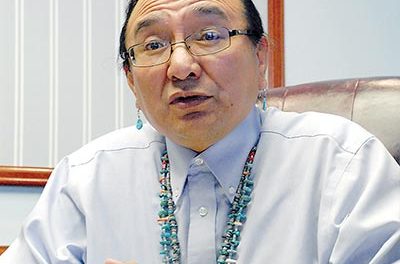
50 Years Ago: Legal column started for Times readers
Navajo Nation Chief Prosecutor Perry Allen has been writing a legal column for the Navajo Times for the past few months and it has become one of the most read section of the Times.
Chet MacRorie, managing editor of the Times, said he thought about having someone write a legal column for years during his previous times with the paper but he could not find someone who had both the knowledge and the writing ability to do it.
But in the summer of 1971, he and Allen attended a meeting and went out to have lunch together and he bought it up.
Allen was immediately interested in the idea and the two spent about half an hour discussing what the column would be about. MacRorie told him he got the idea because of all the letters to the editor he received where people didn’t seem to understand how justice works on the reservation.
Allen decided to call his column “Justice and You” and planned to write one every two weeks.
At first, he used it to give readers a basic understanding of how the law worked, but eventually the paper started getting letters from readers asking specific questions and he used these as topics for his column.
At the time Allen ran a department that handled more than 7,000 cases a year with only eight prosecutors. Fortunately, most were minor cases – drunk and disorderly or simple assault – so they could be dealt with in a couple of meetings with the accused and their defense attorney if they had one.
He was not a big proponent of putting people in jail if he could find a fair alternative. Major cases – murder, sexual assaults and aggravated assaults with a deadly weapon – were handled in federal court so most people who were arrested were looking at most a few months in jail and then only if the crime involved an act of violence.
Although breaking and entering was a common crime on the reservation, with an average of about eight cases a week, the actual number of arrests for this type of crime was relatively low – 20 in all of 1970. But it probably got more questions than any other during the three years he wrote the column.
Readers complained that police made only a few arrests each year and the chance of getting your stolen property back was slim to none. Allen agreed and explained the difficulty police had in catching those responsible and his office in getting a conviction.
Most of the break-ins occurred in the daytime when a family was out of the house working or traveling to a nearby border community to do their shopping. As a result, there usually was clear evidence for police to use to find the culprit.
Police usually didn’t bother checking for fingerprints or blood. They just came by, usually the following day, and took a report. Others did periodically travel to area pawn shops to see if any of the stolen items had been pawned. They just hoped to victims a tip as to the culprit. But even if the stolen piece was jewelry or a Navajo rug, few people took pictures of them so it was difficult to determine if that item had been one that was stolen or had belonged to someone else.
Allen explained in one column that break-ins shot up during the summer leading to a belief that those responsible were of school age and if they were arrested, they would be sent before a family judge who would try to work with the family to stop future illegal activities.
When asked what families should do to keep their prized possessions from being stolen, Allen suggested they buy a lock box and take the items with them when they went somewhere for any length of time. This, however, put the items in danger of being stolen from their car or motel room.
The best solution, he said, was to pawn jewelry and rugs at the local trading post for just a few dollars and get it back when they returned home. He said he could not remember a case of a trading post losing pawn items because they had strong safe to keep the items safe.
It was in one of his columns that I learned there was a big market for medicine bags and many of these were stolen from homes on the reservation. So he encouraged medicine men to pawn the items whenever they weren’t in need of them.
It turned out that a few of these medicine bags became available every year when the owner failed to show up to pay the interest on their bag. Allen said he has seen medicine bags sold for as little as $30.
Anniversary of a disagreement
This must be some sort of anniversary that former tribal chairman Peter MacDonald and I share – the first of many times he and I would have a disagreement.
Some of these would later result in my being fired from the Times but this one was only verbal.
I had been working covering the reservation for about five months and for the most part, my stories were extremely complimentary of MacDonald so there were no conflicts.
Part of the reason for this was my lack of understanding of tribal politics. I was probably so naive at this time that I did not realize that there were members if the Navajo Tribal Council who had less than a positive view of how MacDonald was handling his job.
I was attending a budget session of the tribal Council, my first such session, and I remember sitting in the chamber taking notes when MacDonald started talking in Navajo. All of a sudden everyone was looking in my direction. I didn’t hear him mention my name so I was confused.
Some members of the Council were laughing and after a few minutes, MacDonald gave the same speech in English.
“There is someone here who doesn’t respect this Council,” he said. “He continues to go up to the rail and talking with members of the Council who have more important things to do than answer his questions. I hope he takes this advice to heart or he may find himself being asked to leave.”
Of course, I was embarrassed but it was something I had to get used to because there would be a time or two each year when I would hear my name being mentioned as someone was speaking in Navajo and everyone would look in my direction as the speaker would be critical of something I wrote.
There were times also when a member brought up one of my stories in a positive light and would get a chuckle by calling me “the council delegate from Gallup.”
In this case, Fred Johnson, the councilman from Shiprock told me later that MacDonald had seem me talking to him and, as a vocal opponent of MacDonald, he felt MacDonald was putting me on notice to be careful who I talked to when attending Council sessions.







 Highway 264,
Highway 264, I-40, WB @ Winslow
I-40, WB @ Winslow